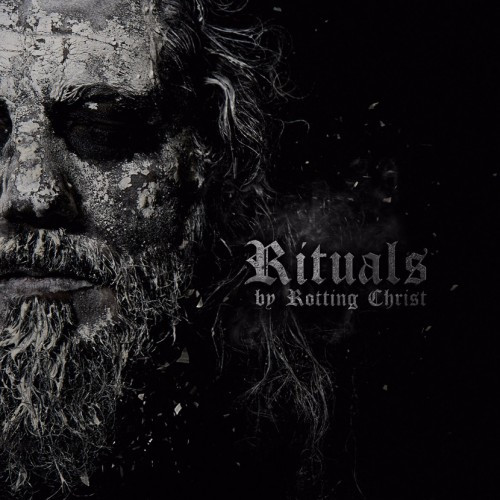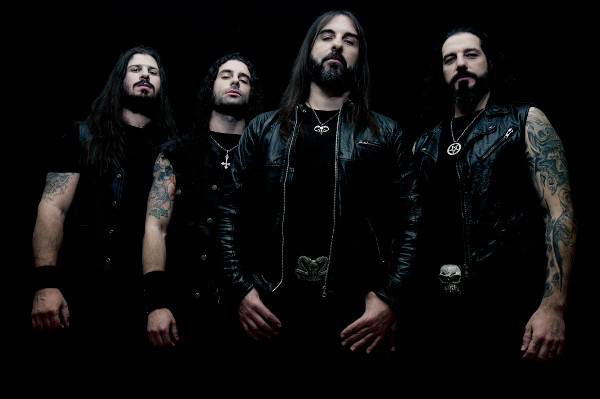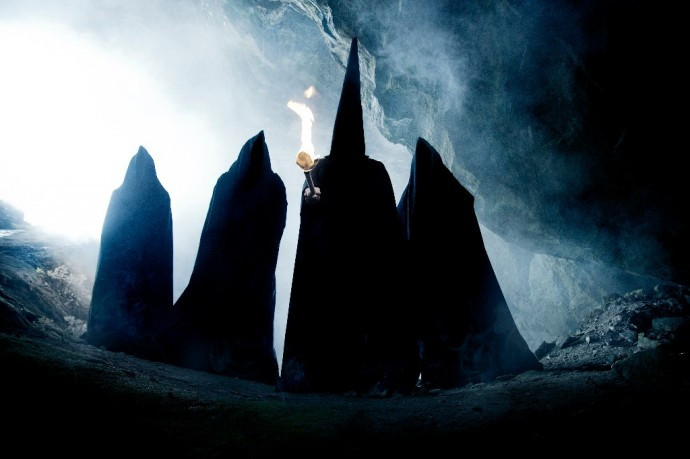(In typically detailed fashion, DGR reviews the great new album by the Greek titan, Rotting Christ.)
Rotting Christ have been an interesting entity over their epic-length career. As a band who have existed since the late ’80s, they have changed form multiple times, firmly held in foundation by the two members who began the group, and as other members have entered and exited the band, the sounds have changed as well.
A career this long will often lead to maybe one golden period and then a slow, steady income for a band, but Rotting Christ are one of the few that have had a couple of huge highlights while at the same time continually grinding it out on the road as well as consistently cranking out disc after disc. Most recently — since the release of 2010’s Aealo — Rotting Christ have been on an absolute tear, planting themselves firmly in the metal scene as one of the best guitar-riff-writing bands out there to date.
It’s an interesting situation, as recommending Rotting Christ to people can sometimes lead (still to this day, even, in a culture of viral shock and awe) to the occasional upturned nose and jaw dropped. Yet I would argue that the band, even limited to the group’s previous three albums (not counting today’s subject), have written some insanely catchy music, working in complete tandem with the part of the band that gives itself so completely over to its chosen subject matter, which 96% of the time is Satan.
As an artist, there are ways that you can set some pretty high expectations for your work. One is to put the word “ritualistic” into play. To describe your work as “ritualistic” implies a certain seriousness and legitimacy to your actions. Using “ritual” as a descriptor brings spiritualism into the picture, and as the two often travel hand in hand, “ritual” sometimes becomes synonymous with “worship”. Naming your album Rituals is one of the ways to set your bar insanely high.
Black metal is a genre with a hefty spiritualistic element in certain sects, and it’s not uncommon to see black metal music referred to as rituals. Though Rotting Christ have slowly strayed away from the genre’s usual musical elements, their sensibilities remain in place, and to be fair, if any band were to name an album Rituals, knowing full well what is being implied and what boundaries will be established from then on, and then fully execute on it, that band would probably be Rotting Christ.
Collected on Rituals are ten songss that continue Rotting Christ’s trend of being one of the best guitar-centric bands around. The group’s writing style on their past few discs has been intensely rhythmic, and that tradition continues in full force on Rituals. Rotting Christ write music consisting of big, martial drum sections and hefty bass lines — their recent music would serve well as the prelude to war. This go ’round sees the band not only moving further in that direction but also delving even deeper into the idea of Satan as a spectre, Satan as a worshipped idol, and Satan as embodying other experiences — such as battle and even the end of the world.
The music is never strictly dedicated to one particular being throughout the album but instead is a collection of ten different “Rituals” that see the band casting a dragnet continents-wide, not only covering multiple languages (French, Greek, English) and subject matter (a variety of different works are cited throughout Rituals) but also bringing in a whole bevy of guest musicians. The list of musicians outside of the main Tolis-core of Rotting Christ plays out so that almost every other song has someone else contributing, whether it be through backing vocals or opening narration. This covers both longtime co-conspirators like George Zaharopoulos (of Necromantia, Thou Art Lord) and new voices in the fold such as Paradise Lost/Bloodbath vocalist Nick Holmes and Rudra’s Kathir. Put succinctly, Rituals feels like Rotting Christ’s biggest play to date, and it has the theatrics to show for it.
Case in point: Rituals opens with “In Nomine Dei Nostri”, which contains a huge drum section invoking different entities — the first few lines being “Hail Pan! Hail Lillith! Hail Naamah! Hail Sabazios!”, with the second verse containing more recognizable names like Bast, Astaroth, Hecate, and Mania, among others — before kicking into the actual song, which is Rotting Christ playing as firmly to their strengths as they ever have.
The opening of Rituals is a bit more blatantly Satanic in subject matter than the last two discs were, yet musically it falls right in line with the hammering guitars and mid-tempo blast beat that Themis Tolis has long made the foundation of Rotting Christ’s sound. The main refrain of the the song, “In Nomine De Nostris Satanas Luciferi Excelsi!” is one that comes to mind almost automatically now; all I need to do is hear the opening lines and already the chorus comes bursting into my brain like an invader from another city-state.
It may seem like I’m pounding the nails a little too far into the wood on this one, but I am not kidding whenever I reiterate that Rotting Christ are secretly some of the most infectious songwriters out there right now. You pick up on where the songs are going almost immediately, and even seeing them live, it’s hard not to be the world’s biggest Rotting Christ fan for the time they’re on stage; that feeling is one that largely carries over in their recorded material, Rituals being the latest example of that. They make Lucifer fun.
“λθὲ κύριε (Elthe Kyrie)” is another fast-moving track that sees vocal duties rotating between the manic delivery of Danai Katsameni — who delivers the lion’s share of the song as it is partially screamed and ranted — and Sakis, who picks up the chorus sections of the song. From the first word it seems like each verse is accelarating toward oblivion. It’s one of the handful of times when Rituals goes truly fast, before moving back into a more martial and mid-tempo chorus section. A lot of Rituals feels paced like this song, with a couple of the tracks being more experimental than before and making Rituals feel like a dynamic listen.
“Του θάνατου (Tou Thanatou)”. for example, is a slower track in the latter half of Rituals and it is mostly sung, which means that you’ll inevitably find yourself with the first few lines stuck in your head for days. You recognize its hallmarks as a Rotting Christ song almost immediately, with the tightly-wound guitar sections that propel the whole song forward and the hammering double-bass pedal. The whole song feels like the a war ritual in its own right. If we ever return to the days of melee battle, in which massive armies square off with each other in sword/shield combat, songs like “Tou Thanatou” are going to be played, because Rotting Christ have mastered the tribal-warfare songwriting style. The easily picked-up-on and memorized chants and the huge drums and backing instruments make the four-piece feel like a legion in their own right.
In keeping with the overall theatrical nature of Rituals, there are a few interesting experiments outside of the main course of marching guitar sections and earworm chants. Rotting Christ aren’t one for small interludes; they play them up as large interstitials. The opening narration of “For A Voice Like Thunder” is pulled from “Prologue, intended for a Dramatic Piece of King Edward the Fourth” by William Blake as it beseeches the listener, amidst a gallery of horrific events, “Who can stand?”
“Ἄπαγε Σατανά (Apage Satana)” is another — and a personal favorite — consisting of huge drumming sections and a call-and-response between the voice directing the drums and the crowd listening. Were Rotting Christ granted a limitless budget and time for a set, I would love to see this one performed live with a massive set of drums, as each strike feels like it could vibrate the Earth.
By the time the Rituals‘ end comes around, you’ll have gotten the sense that the disc is covering a pretty wide ground of different subjects dedicated to Satan, and the band still have one more surprise. Rotting Christ close the album with a cover song. The song, “The Four Horsemen”, was originally performed by the Greek progressive rock band Aphrodite’s Child on their 1972 album 666, a concept album about John and the Book of Revelations. The original song in its ’70s form starts off fairly slowly but is clean-sung, before picking up and actually coming off as a pretty strong prog track. It is an up-tempo song that takes a few strange turns, and you could’ve easily crossed paths with it on the radio, even nowadays.
Rotting Christ put their own spin on it by slowing the whole track down, stretching it out a bit, and making it a more meditative piece of music. It’s the slowest-moving and most melodically-minded song on Rituals, which is part of the reason why it stuck out so much on my first listen. Without initially being aware of its status as a cover song, I could sense that its roots did not initially lie in Rotting Christ’s style, but quickly found that the band had basically resurrected something of a cultural artifact in covering the song, morphing it into one of their own slow-crawling rituals to close out the album. “The Four Horsemen” has about two verses, but the multiple repetitions of the chorus focusing on describing the color of the horses means that the song tends to grind its way into your brain.
The thing that keeps Rituals fresh across multiple listens is that the disc feels more like an event than a collection of singles. It speaks to the effectiveness of good pacing that Rituals works as well as it does; the songs feel perfectly placed, and the more dramatic interstitial sections slot in well next to faster songs, ensuring that Rituals doesn’t drag for too long. It gives the album the dramatic effect that a name like Rituals connotes, and obviously it helps a ton that the disc is built upon a foundation of expertly crafted songs.
Rotting Christ are again proving themselves the experts of the mid-tempo headbanging track, built perfectly for the “hey! hey! hey!” cheers that often accompany them at concerts. Early 2016 seems so far to consist of bands at war with each other in trying to top their previous output, making it insanely difficult for anyone to try to stick with one album for very long, because so much good music has been coming out in the front two months of this year that you’re constantly being pulled in a million listening directions. It is an excellent problem to have, insane as it sounds, and Rotting Christ are only exacerbating it with Rituals — a more dramatic and theatrical take on the group’s proven formula.
1. In Nomine Dei Nostri
2. זה נגמר (Ze Nigmar)
3. Ἐλθὲ κύριε (Elthe Kyrie)
4. Les Litanies de Satan (Les Fleurs du Mal)
5. Ἄπαγε Σατανά (Apage Satana)
6. Του θάνατου (Tou Thanatou)
7. For a Voice like Thunder
8. Konx om Pax
9. देवदेवं (Devadevam)
10. The Four Horsemen
Rituals will be released on February 12 by Season of Mist. Stream the full album below.
https://www.facebook.com/Rotting-Christ-290468585669/




Gotta give this another few spins. The reviews I’ve seen are split, so I’ll have to rely on my own judgment this time.
Phenomenal album! Absolutely crushing!